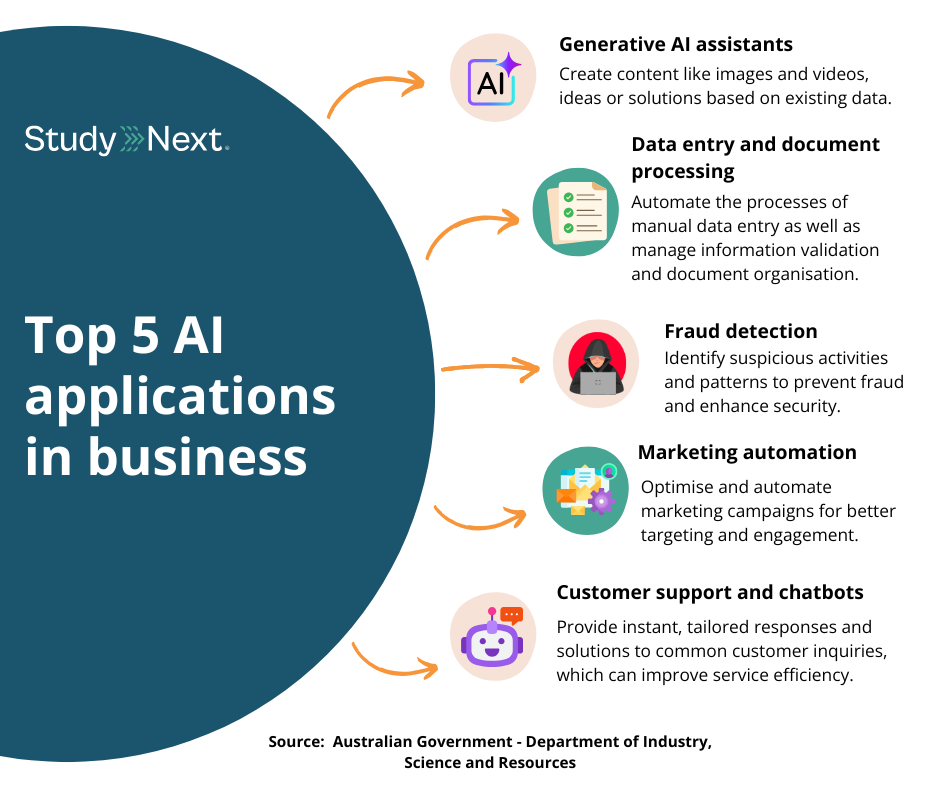
Artificial intelligence (AI) is reshaping how organisations operate and deliver value. As AI continues to develop rapidly, how can businesses and employees adapt to it to stay competitive in the future of work?
Read further to discover common obstacles and benefits of adopting AI at work, as well as how employers and employees can ensure a smoother AI implementation. You’ll also learn how AI courses can help you prepare for an increasingly AI-driven business environment.
AI in the workplace: an overview
AI in the workplace refers to the implementation of AI technologies to enhance business operations. There is plenty of research that highlights the adoption of AI at work. In 2024, the Australian Industry Group found that 52 per cent of businesses across the nation have already adopted AI technologies. Mercer’s Global Talent Trends report, published in the same year, revealed that 44 per cent of Australian executives think that their company will not survive past 2030 without AI. According to the 2025 AI Deployment and Governance Survey Report by the Governance Institute of Australia, 90 per cent of Australian workers reported AI usage in their companies, though often in isolated functions and without leadership supervision.
While the exact figures vary, these reports lead to the same conclusion: AI is rapidly becoming a central part of the workplace across Australia.
AI applications in the workplace
AI serves various functions across work environments in nearly every industry, such as automating tasks, streamlining workflows and supporting innovation. Business analysts, for example, can leverage AI and machine learning to examine data and develop predictive models that can derive insights for decision-making. Those working in the manufacturing industry can utilise AI technologies to detect anomalies and build control systems for autonomous machinery.
The federal government listed the top five applications favoured by businesses adopting AI in the fourth quarter of 2024. Find out what they are and what they typically entail below:

Common barriers to adapting to AI at work
Common challenges to adapting to AI in the workplace include AI skills gap in the workforce, data privacy issues, misinformation and organisational resistance to change. These issues must be addressed to facilitate AI adoption effectively. Find out what each barrier entails below:
-
Lack of expertise
The shortage of qualified talent in the workplace is a significant barrier to AI adoption. According to Mercer’s 2024 report, 64 per cent of Australian executives feel that technology is evolving faster than their companies can reskill their workforce, which creates a growing skills gap. This struggle to keep up with rapid technological advancements is also a major concern for senior leadership teams.PricewaterhouseCoopers (PwC)’s 2025 CEO Survey revealed that CEOs in Australia identify internal skills and capabilities as the biggest challenge to adapting to AI at work.
These findings demonstrate the urgent need for businesses to prioritise building an AI-driven workforce to avoid falling behind their competitors and remain relevant in the business world.
-
Data privacy concerns
As AI systems consume vast amounts of data, including personal data, to function effectively, it can cause apprehension around data security in the workplace. Ipsos’s AI at Work report in 2024 disclosed that an overwhelming 79 per cent of Australian employees worry about how their online data is being used by companies. Businesses need to address these concerns to build trust and confidence in AI technologies among employees. -
Misinformation
While AI can be a powerful asset in the workplace for many purposes like data analysis and task automation, it also carries the risk of producing inaccurate or misleading information. This can pose a great risk as flawed insights may influence critical business decisions and strategies.Experts across Australia and New Zealand also take this issue very seriously. A 2023 poll on GenAI published by the Information Systems Audit and Control Association (ISACA) highlights that professionals working in audit, risk, cybersecurity, data privacy, and IT governance in both countries ranked misinformation as the number one risk associated with AI.
-
Cultural resistance
Adopting AI doesn’t just involve technological upgrades but also requires effective change management in the workplace. The 2024 Ipsos report revealed that while 40 per cent of Australian employees believe that AI can make their jobs easier, an almost equal proportion of them also express concerns about job security. This may reflect the general worry of many workers that AI can automate their roles and make their skills obsolete. Having this fear may cause them to resist AI by not wanting to learn new AI-powered tools, as they may believe that embracing AI allows the technology to eventually phase them out.
Advantages of AI in the workplace
AI offers a wide range of benefits in the workplace, particularly in boosting business productivity and performance. These advantages not only support employees, but also businesses and the broader Australian economy:
Employees
Employees who are adept at using AI can not only expect to make their workflows more efficient but also significantly boost their earning potential. According to PwC’s 2024 AI Jobs Barometer report, AI-skilled professionals earned an average 56 per cent wage premium in 2024 globally, which is more than double the 25 per cent recorded in 2023. In Australia, Amazon Web Services (AWS) reported in the 2024 Accelerating AI Skills study that employees with AI skills can expect their salaries to increase by 29 per cent or more. These insights demonstrate how developing AI capabilities can grant you a strong advantage in today’s competitive job market.
Businesses
AI is proving itself to deliver real, measurable results for businesses across the country. Australia’s national science agency, CSIRO, found that companies using AI-enabled solutions saw an average 30 per cent time savings in existing processes of every AI initiative. This improved efficiency can be applied across diverse departments. According to the AWS study, 80 per cent of Australian employers expect AI to benefit various functions like sales and marketing, research and development as well as business operations. This shows that AI isn’t just a tool but a fundamental strategy for enhancing overall organisational performance.
Australian economy
AI has the potential to add between $45 to $115 billion annually to the national economy by 2030, based on the 2023 Australia’s Generative AI opportunity report published by Microsoft and the Tech Council of Australia. This possible contribution is equivalent to two to five per cent of Australia’s economy. This forecasted impact shows that with the right investment in skills, infrastructure and policy, Australia can position itself as a global leader in AI economic transformation.
How to adapt to AI in the workplace
To successfully adapt AI at work, businesses and employees should prioritise developing AI literacy, establishing clear AI policies and embracing AI tools. They should also focus on enhancing uniquely human skills that are beyond AI’s capabilities to complement their digital skills. Discover how employers and employees can foster effective AI integration below:
Build an AI-driven workforce
Employers need to invest in their internal workforce by offering targeted AI training and upskilling opportunities to leverage the power of AI effectively. Mercer’s 2024 report revealed that 70 per cent of Australian executives are concerned that their organisation is not doing enough to motivate employees to adopt new technologies. The AWS study reported that 73 per cent of Australian employees don’t know which AI skills they need, while 76 per cent of them are unaware of available training programs. To overcome this gap, employers must offer clear guidance and make training accessible to teach employees the best ways to use AI at work.
Another way to build an AI-powered workforce is to hire talent with AI skills. In fact, 63 per cent of employers surveyed by AWS are prioritising the recruitment of workers with AI capabilities. This makes AI talents extremely valuable and highly sought after. According to PwC’s AI Jobs Barometer report, the number of AI-related job postings skyrocketed from 2,000 in 2012 to 23,000 by 2024, demonstrating a high demand for these skilled professionals.
Bringing in more AI talents, whether through upskilling internally or hiring, makes it easier for businesses to adopt AI technologies. With the right staff, organisations can keep up with rapidly developing AI trends by constantly innovating themselves.
Have clear AI policies
Businesses need to provide proper usage guidelines on how to use AI at work to ensure safe and effective adoption. AI is already being used in workplaces, regardless of whether organisations have proper regulations to govern it. Microsoft’s Work Trend Index 2024 report disclosed that 84 per cent of Australian employees are using AI at work, while 78 per cent of them are bringing their own AI tools to work. Without clear policies, this practice has the potential to compromise sensitive company data if left unmanaged.
Having AI policies not only sets expectations of how AI should be used but also helps develop suitable training programs for proper AI implementation. Once AI policies are in place, employers can encourage employees to share their own AI use cases to demonstrate how this technology helps make their work more efficient. Not only can real-world examples of AI in the workplace reinforce how to leverage this technology properly within the business, but they can also serve as evidence for leadership teams to justify further investment in AI initiatives.
Build inclusive AI strategies
Businesses should develop AI strategies that are inclusive and consider the needs of all workers. Not every employee experiences AI the same way. Often, their perspectives are shaped by age, gender, professional role and other factors. The AI at Work report by Ipsos highlights these differences clearly. Younger generations like Gen Z and millennials tend to be more worried about AI’s impact on their careers compared to senior executives. Meanwhile, men show greater optimism about AI than women, which may suggest potential gender gaps in AI adoption.
To unlock the full potential of AI successfully, businesses must consider the social dynamics that come with it. They need to develop inclusive AI approaches that transcend barriers like generational and gender divides to ensure no one gets left behind in its implementation in the workplace.
Learn to work with AI tools
As employers across Australia invest in building an AI-powered workforce, it’s equally important for employees to meet them halfway by taking the initiative to understand and engage with AI technologies. Instead of viewing AI as a threat to their roles, employees should see it as a collaborative ally that can enhance the quality of their work and improve efficiency. This involves understanding how AI adds value, how to apply it ethically and when to rely on human judgement.
For example, those working in marketing teams can learn how AI can enhance customer experience, tailor personalised ads and analyse customer behaviour. On the other hand, human resource professionals can learn how to automate repetitive tasks with AI and focus more on people rather than paperwork. No matter the department or industry, becoming familiar with AI tools empowers employees to stay ahead in an evolving digital landscape.
Focus on irreplaceable human skills
Employees should focus on developing human skills that cannot be replicated by AI. While AI excels at many functions, including automating tasks and extracting insights from data, it can’t replace uniquely human skills, such as emotional intelligence, critical thinking and creativity. In fact, Indeed’s 2024 Skillfully Aligned report disclosed that the top four skills needed for success according to Australian employers and employees are human skills, followed by IT savviness:
- Communication
- Teamwork and collaboration
- Critical thinking and problem-solving
- Adaptability and flexibility
By honing these distinctly human capabilities, employees can position themselves as effective collaborators in an AI-integrated work environment. These skills allow them to navigate interpersonal dynamics and make nuanced decisions that AI can’t deliver. Employees with strong soft skills can secure their place while working alongside AI to collaborate with various stakeholders, lead teams and drive innovation at work.
Upskill with AI courses
A practical way for you to adapt to AI in the workplace is to advance your qualifications with postgraduate studies. Gaining formal education in AI can offer a significant competitive advantage as these courses are designed to equip you with the knowledge and skills to confidently engage with AI technologies. These programs not only build strong technical foundations but also help develop critical thinking and problem-solving skills necessary for leading AI initiatives within organisations.
Many Australian institutions offer various course levels to suit the needs of their learners, from graduate certificates to master’s degrees. Courses may also offer added advantages to students. For example, Monash University’s Master of Artificial Intelligence is recognised by the Australian Computer Society (ACS), which means you are automatically eligible to become a member. This offers you valuable networking and professional development opportunities. Deakin University provides state-of-the-art labs and studios for Master of Applied Artificial Intelligence students, allowing you to experience hands-on learning with robotics, virtual reality and cyber-physical systems.
If you aren’t able to commit to a full, traditional degree, you can also explore short courses, which will enable you to apply what you learn at work immediately. These programs typically offer targeted learning, allowing you to learn the specific skills you want. For example, the Generative AI Masterclass short course at the University of Sydney focuses on how prompt engineering in GenAI works and its limitations. CPA Australia’s AI Ethics for Modern Professionals delves into the social impacts, regulations and strategies to ensure fairness and accountability in AI systems.
Short courses can usually be completed in a few hours to several months, allowing you to boost your skill set without disrupting your work commitments while balancing other responsibilities. You can also take multiple short courses as a form of continuous learning to ensure you remain relevant and ready to thrive in an increasingly AI-powered work environment.


Artificial intelligence is going to be your co-pilot at work. In this interactive online workshop, learn to use the current generation of Generative AI tools like ChatGPT and Midjourney.
This three-hour workshop, delivered by Sydney Executive Plus, will explore the fundamentals of Generative AI: how the technology works, its limitations and risks and how it can be used productively in the workplace. Participants will experiment with prompt engineering in text—and image-generating AI tools.
- Understand generative AI - Discuss the technology that enables generative AI with confidence.
- Create value for your organisation - Increase productivity and save time by using AI in your workplace.
- Master prompt engineering - Use the latest generative AI platforms to get the best results.
- Build your network - Connect with like-minded professionals interested in the future of work.
This course is included for free as part of the AI Fluency Sprint.


Artificial Intelligence (AI) in the workplace offers exciting new business opportunities, but it must be implemented responsibly and ethically. This interactive module explores the evolution of AI, how AI works and the associated ethical issues.
This course comprehensively explores the ethical considerations essential for the responsible development and deployment of artificial intelligence (AI) technologies. You will gain a deep understanding of the intersection between AI and ethics, focusing on the societal impacts, regulatory frameworks and practical strategies to ensure fairness, transparency and accountability in AI systems. Through a blend of theoretical insights and real-world case studies, this course will equip you with the knowledge and tools necessary to navigate the ethical challenges posed by AI in the workplace.
Featuring videos, examples and real-world applications provided by industry experts and financial leaders to embed the learning and bring the content to life, you will gain the tools and techniques increasingly important in modern finance roles.


VU's Graduate Certificate in Artificial Intelligence provides you with a solid foundation of AI technologies and skills for application development, including modern programming skills, data mining, data analytics, neural networks, deep learning and natural language processing.
World-class academics who are active in advanced AI research will provide you with examples of modern AI technologies and show you how they can be applied to provide innovative solutions to real-world problems. Guest lecturers from the AI industry will also discuss their experiences of the latest developments and applications of AI in industry.


The Graduate Certificate in Artificial Intelligence and Machine Learning, conducted through the University of Adelaide’s world-renowned Australian Institute of Machine Learning (AIML), will prepare you for an exciting career in this pivotal field.
This degree will equip you with a suite of technical skills in machine learning and AI application development, including in specialist areas, such as deep learning and visual question answering. You will gain broad awareness of the commercial, organisational and research opportunities presented by machine learning and AI. The degree offers an introductory understanding of the disciplines’ ethical and social considerations. You will also be equipped with the necessary foundation of skills and understanding to embark on work or further study in artificial intelligence or machine learning.


The graduate diploma artificial intelligence course provides IT and computing professionals with the opportunity to upskill and meet the demands of this rapidly changing field. The course covers a broad range of current and emerging areas of AI including data analytics, data visualization, machine learning and neural networks.This course also provides ideal preparation for graduates seeking careers in data analytics, AI/ML engineer and its related domains. Students in the course engage in practical and hands-on learning by using technologies to develop algorithms in various AI fields.
Choose this course to transition to the dynamic field of AI, where you'll develop a robust foundation in data analytics, visualisation and machine learning.


Learn to use AI technology in a wide range of contexts, including digital healthcare, smart manufacturing, smart cities, sustainable energy infrastructure, precision agriculture and more. You'll learn from world-renowned lecturers who are leading the advancement of virtual reality and computer engineering.
Get a hands-on approach. Use your AI skills to solve real-world problems when you take on an industry-based project with leading organisations including Microsoft, Optus, 4Pi Labs, Aerion, Quantum Victoria, Nanjing University of Information Science and Technology, Pivot Maritime International and Axicor.


At Monash, you’ll learn from the best minds in the field and take part in research that’s breaking new ground. Gain specialist knowledge and adaptability to work at the forefront of AI. We’ll train you to design, develop and operate AI-based products and intelligent systems to boost the progress of healthcare, science, agriculture, education, manufacturing, law, financial services and more.
Key topics include deep learning, knowledge representation and reasoning and modern optimisation techniques. You’ll also have the expertise to implement ethics in AI and inform best practices.
This course is accredited by the Australian Computer Society (ACS). This means you’ll automatically be eligible to become a member, opening doors to invaluable networking and professional development opportunities.


Many companies want to understand and harness this transformative technology in a world where artificial intelligence (AI) is reshaping industries. With Deakin’s Master of Applied Artificial Intelligence, you will acquire the specialised knowledge and skills essential for designing and developing software solutions that leverage the power of AI. Get ready to graduate as an in-demand professional worldwide.
The Master of Applied Artificial Intelligence (Professional) extends the Master of Applied Artificial Intelligence by allowing you to undertake industry-based learning or engage in an in-depth research project under the supervision of our internationally recognised research staff.
As an AI specialist, you will collaborate with multidisciplinary teams, including software engineers, data scientists, application developers and business analysts, to ensure appropriate integration of AI into software solutions from a technical and human perspective.
Our world-leading research in AI feeds directly into our classrooms, meaning you will be learning at the cutting-edge of industry expectations and capabilities. Graduate with the hands-on experience to confidently work on designing, developing and operating AI-driven software solutions.
Embrace the future of digital disruption and embark on a journey that immerses you in AI technologies, deep learning and reinforcement learning. Explore the application of these algorithms in computer vision and speech processing, paving the way for innovative solutions across diverse sectors.
Artificial intelligence is driving digital disruption across almost every sector, redefining the workforce and creating global demand for skilled professionals. There will be more than 220,000 roles (25.3% growth or 44,700 new jobs) for software and application programmers in Australia in the next 10 years.^
With this significant projected job growth, now is the time to future-proof your career. By enrolling in our Master of Applied Artificial Intelligence (Professional), you position yourself at the forefront of this thriving field, equipped to drive innovation and shape the future of technology.
This course focuses on developing skills in data science, data modelling and design, machine learning, numerical analysis, programming and software development.
Thrive in an AI-driven business world
As AI continues to evolve rapidly in today’s business landscape, staying competitive means continually upgrading your skills. One of the most effective ways to do this is by taking AI courses that enhance your ability to leverage AI tools in the workplace effectively. Whether you're interested in a short course or a full master’s degree, you can find plenty of programs that can suit your learning and career goals. Take the next step in your professional development today and explore a range of AI courses offered by top institutions in Australia.



















